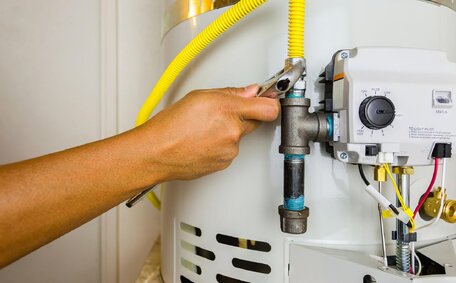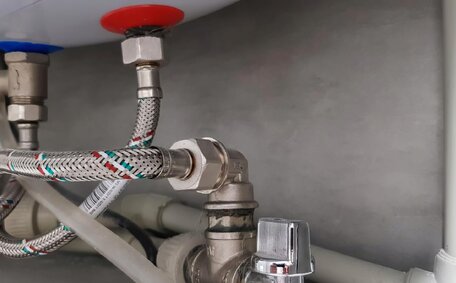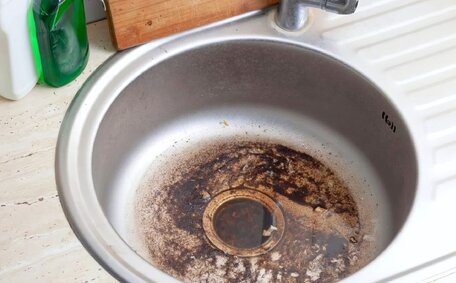Introduction: Is a Leaking Water Heater an Emergency?
Noticing hot water leaking from your system can be alarming, but not all leaks are emergencies. A leak hints at a potential heater emergency that often demands professional attention. However, a water heater leak doesn’t always call for emergency action.
This guide details how to identify leak signs, judge their severity, and take decisive action.
Learn to detect leaks, take immediate action, determine when it’s an emergency, and prevent future issues.
This advice prepares you to respond quickly and correctly to leaks, helping you prevent potential emergencies.
Identifying a Leak: Signs to Watch For
Common indicators of a leaking system include:
- Puddles or wet spots on the floor near the water heater, especially if the puddle grows over time
- Rusty coloured water trickling from the water heater or pipes
- An increase in your utility bills could signify a leak
- Strange noises like drips, hisses or gurgling coming from the water heater
The presence of any of these signs warrants closer inspection if you suspect your system is leaking. Check for moisture around pipe connections, the relief valve, tank base, and fittings. Use a flashlight to check under and around the water heater for any water coming from hairline cracks or pinholes.
Locating the Source of the Leak
Embarking on the quest to pinpoint the precise origin of your leaking hot water system involves contacting your plumber to examine critical junctures and parts:
- The temperature and tp valve, where water is released to manage pressure, is a common source of leaks. This safety valve releases water when interior pressure or temperature get too high, preventing explosion. A leaking T&P valve may indicate a risk of catastrophic tank failure.
- Leaks often originate from faulty fittings and pipe connections on your unit. Eroded, fractured, or unsecured fittings can cause leak scenarios, letting moisture break free.
- In electric hot water tanks, the heating elements may leak water if their gaskets wear out. Your gas hot water heaters can leak from burner components or gas lines.
- A leak at the tank’s base could indicate cracks or rust, signalling the need for replacement. This usually means the tank has rusted through and requires replacement.
Identifying the precise leak location is crucial for determining when to call plumber services, assessing repair feasibility and preventing secondary damage. Misdiagnosing the water heater leaking source, can worsen system failures or plumbing issues.
Assessing Severity: Minor Leaks vs Major Leaks
Water heater leaks vary in severity. Minor leaks may cause inconvenience but likely don’t pose immediate risks if addressed promptly. Major leaks, more serious in nature, which can lead to substantial water damage or dangerous situations require prompt emergency service.
Minor Leaks
- Minor leaks may result in slow drips confined to small areas
- Water loss of less than approximately 1 litre per day
- Minimal property damage and plumbing issues
While irritating, minor leaks that only slightly affect water pressure are not emergencies. Turn off water supply to halt the leak until the leaking hot water heater repair issues can be addressed. Closely monitor leak sites and catch pans to make sure the leak can be managed and doesn’t worsen until water heater repair can be arranged.
Major Leaks
- Large leaks causing rapid water loss of several litres per day
- Leaks impacting multiple rooms or systems warrant urgent attention.
- Potential for burst pipes, severe floods, water damage, electrical issues
- Possible tank cracks or pipe bursts
Major leaks compel you to call emergency help without delay to prevent catastrophic damage. Burst water heater tanks, or heater tank leaks, also risk releasing high temperature water leading to scalds.
When water heater malfunctions result in rapid soaking of walls, floor joists and subfloors, it results in mould, warped structures and ruined possessions. And while rare, ignition of a gas leak from a gas hot water heater can cause an explosion.
Taking Immediate Action: Steps to Stop a Leak
If you discover a major leak in your hot water system, take these steps right away while waiting for emergency plumbing assistance:
- Locate the main shutoff valve and turn off the water to stop the flow.
- Shut off the electrical supply to your hot water system, particularly when blocked drains increase risk.
- For gas systems, swiftly shut off the gas to mitigate risks associated with potential leaks.
- Use towels, buckets, and containers to manage the leak and protect your property.
- Assess and shut off power to prevent electrical risks if water contacts outlets or appliances.
- Cordon off any slippery areas to avoid injuries from falls.
- Ventilate rooms affected by leaked gas to prevent dangerous buildups.
- Secure your home by keeping family, pets, and valuables clear of flooded areas.
- Call your trusted Castle Hill Plumbing immediately about emergency repair or replacement service before severe damage can occur.
Prompt action at the first sign of a major leak can help prevent extensive property damage. Our skilled team is available around the clock for emergencies.
Calling For Help: When it Becomes an Emergency
Situations that could pose hot water dangers may necessitate urgent assistance:
- There is rapid or excessive water loss that risks flooding damage
- Leaks that can’t be accurately located or contained call for professional help.
- Hot water leaks might need immediate intervention due to the scalding danger they present
- The water heater fails catastrophically with a ruptured tank
- Lack of water intensifies safety and health concerns.
- Gas leaks create an explosion or poisoning danger
- Electrical hazards arise from water contacting appliances or outlets
In emergency scenarios, like a severe hot water leak, immediately evacuate the area and contact Castle Hill Plumbing on 1300 349 338. Our skilled emergency plumbers are on call 24/7 to provide a response. We’ll take actions to stabilise hazards, prevent further damage, and give us a shout to ensure your hot water is restored swiftly.
For non-emergencies, attempt to confine the leak and give us a call to arrange for a plumber, and contact us during business hours for same-day repair appointments. Preventative steps can combat the lack hot water crisis and guarantee a continuous flow without the risk of catastrophic leaks. Contact Castle Hill Plumbing to inspect your water heater annually.
Preventing Future Leaks
While it’s difficult to completely prevent leaks, you can take measures to reduce the chances of your hot water system springing a leak and minimise potential damage if one does occur:
- Have your water heater inspected annually by a licenced plumber to check for early signs of wear, corrosion or flaws needing repair.
- Installing leak detectors with automatic shutoff valves can prevent major floods. These systems detect plumbing leaks and can automatically shut off water supply to prevent major flooding if you’re away.
- Place a drain pan equipped with a leak alarm beneath the hot water heater, close to the drain valve, to catch minor drips and alert you to leaks before major damage transpires.
- Consider upgrading traditional hot water tanks which could also opt for energy-efficiency to solar hot water systems after 8-12 years of use before corrosion sets in and leads to failure. Choose quality systems with durable components.
- Maintain clean, dry top and bottom surfaces on your water heater to hinder corrosion and regularly check for leaks.
- Have a plumber apply protective pipe wrap to defend against corrosion on pipes and fittings.
Proactive maintenance steps can protect your system from small issues escalating into catastrophic failures. Contact our team at Castle Hill Plumbing on 1300 349 338 to learn about hot water system protection options or schedule annual inspection appointments to catch issues early.
Replacing vs Repairing Your Water Heater
Deciding between repairing or replacing a leaking water heater is a common dilemma. There are several key factors to weigh when making this decision:
When Repair May Be Preferable
- If the water heater is less than 5-7 years old
- Fixable minor leaks from fittings, valves or anode rods
- Tank surface rust but no leaks or failures yet
- A repair is the more affordable option for the moment
Targeted repairs can often restore a newer system at a lower cost than full replacement. Over time however, deterioration may lead to declining efficiency and eventual leaks.
When Replacement is Recommended
- Water heaters beyond 8-12 years may have exceeded their service life.
- Significant tank corrosion, holes, cracks or bulges
- Heating elements, thermostats, valves requiring frequent repairs
- High energy bills from inefficient operation
- Upgrading to a superior energy-efficient model
When older system components fail, the risk of complete hot water loss due to major leaks or flooding spikes. A new system replacement enhances safety and performance. New models offer enhanced leak prevention, longer warranties and it’s time give better energy ratings over outdated heaters.
For a professional recommendation on repairing or replacing your water heater, give us call to contact the licenced technicians at Castle Hill Plumbing on 1300 349 338. We’ll assess your system and give us call to help determine the most suitable and cost-effective solution.






